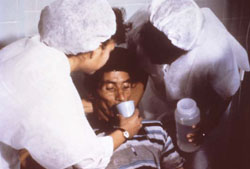33.5.2 Treatment of bacterial and viral diarrhoeal diseases
As you already know, for all patients with diarrhoea (watery or bloody), the core measure in treatment of all cases is rapid and adequate rehydration – fluid replacement. This is usually achieved by the patient drinking plenty of fluids, but in the most severe cases the fluid has to be given intravenously (directly into a vein). Rehydration should be started as soon as possible and continued for as long as the diarrhoea persists. The best fluid to prevent or treat dehydration is a solution of oral rehydration salts (ORS) – a simple mixture of sugar and salts in the correct proportions mixed with boiled and cooled water (Figure 33.6).

In addition to rehydration, other interventions might also be necessary depending on the type of disease and the age of the patient. For children with diarrhoea, the measures that you should undertake during treatment were summarised in Box 32.1 in the previous study session. However, before you can treat a child with diarrhoea correctly, you first need to learn how to assess and classify the danger signs and the level of dehydration; this is taught in detail in the Module on the Integrated Management of Newborn and Childhood Illness (IMNCI) in this curriculum.
![]() A patient in shock due to severe diarrhoeal disease will die without adequate and rapid rehydration.
A patient in shock due to severe diarrhoeal disease will die without adequate and rapid rehydration.
For adults with severe diarrhoea, assess if the patient is able to take fluids orally. If they are too weak or nauseous to take fluids orally, or they are showing signs of shock, refer them immediately to the nearest health centre or hospital. Advise the patient or caregiver that immediate treatment is necessary to save the patient’s life.
If the patient is able to take fluids orally, give ORS and tell them to drink 200–400 ml of ORS after each loose stool. Advise the patient to drink other fluids as much as possible and to continue eating. Adults with severe diarrhoea due to bacteria may also need an antibiotic treatment appropriate for the specific disease, after first determining the type of bacteria from laboratory examination of a stool sample. This is one reason why adults with severe diarrhoea are given ORS and referred to a higher health facility.
33.5.1 Diagnosis of diarrhoeal diseases
